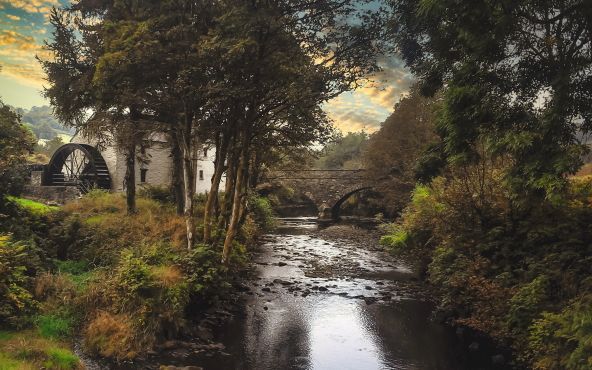Folk-Memory and Land: The Diggers and the Anglo-Saxon Land Tradition
Folk-Memory and Land: The Diggers and the Anglo-Saxon Land Tradition
By Edward Barnett
The law condemns the man or woman
who steals the goose off the common
but lets the greater villain loose
who steals the common from the goose
I first became interested in the question of land in my teenage years. My sixth form college was near Clapham Common and I spent many idyllic hours lying on the grass, listening to the sound of the South Circular road. I became, in time, interested in the nature of the commons and from that, our interest in land in general. This has been accompanied by a keen interest in philosophy and history and over the years I have come to a conclusion. I believe history presents moments where ideas relating to the past are kept alive and can be applied to the present. The conceptualisation of these lost memories help to identify problems at a particular time but also provide a methodological framework for a more just and equitable society.
The Diggers were one such group who resuscitated, for a popular audience, the land traditions of the Anglo-Saxons. A group who dominated the same islands some 800 years beforehand. I believe the success and failures of both groups, and the linked memory of them, provide guidance for us today.
Folk memory, as defined by the Cambridge dictionary is “the knowledge that people have about something that happened in the past because parents have spoken to their children about it over many years”. Folk memory is often linked to folklore and cultural history but very little has been said about its relationship to the land.
To make sense of this somewhat ephemeral concept it is worth considering the work of John Locke. Locke is often given short shrift (quite rightly) in discussions regarding the land due to his unhelpful impact on it. The idea that land could be held in perpetuity by an individual due to their labouring of it was popularised by him. He also cemented this idea in the popular conscience in the UK and later in America given his position as Secretary to the Lords Proprietors of Carolina – so much so it was considered by him and his advocates, a natural law. But it is not his (incorrect) opinions on the nature of land that warrant attention, but rather his thoughts on personal identity.
Locke held that personal identity, essentially what makes us ‘us’, is located in the memory of the person. We are substantially different to who we were in our infancy as we have grown and learnt and developed. But we are still the ‘same’ person. Locke argued that this continuation of identity, the thread that keeps the young child, the middle aged family person and the aged elder, is the memories that person holds of their younger, former self. This is why diseases of the mind, such as dementia, which effect memory so profoundly, are so awful. We do not just sense our loved one is suffering, but we also might sense we are losing, or have lost, the person entirely. The loss of the memory of oneself can have devastating consequences.
It is no different when we consider the memories a society has of itself, told from one generation to the next. The folk memory is what ties a culture to its traditions and its inheritance. A society that ‘forgets’ what it once might have had, suffers, and risks undergoing its own kind of ‘cultural dementia’. Conversely, we will also consider cultures which have a more unbroken link to remembered land traditions seem, on the whole, to be more just and equal societies. There are fewer instances of societal trauma caused by a societal ‘forgetting’.
Land, as we know, is a huge topic. Here we will focus on the use and abuse of the commons in England. Commons have been essential for sustainable rural life, and later, urban recreation. It seems evident that the treatment of common land is a litmus test of a wider societal treatment and understanding of land. Commons in England have a long history, stretching back to the Neolithic period, through to the Roman occupation and cemented during the Anglo-Saxon period (approx. 500 AD-1066 AD). The Norman Invasion of 1066 introduced a more formalised feudal system and replaced the ancient rights of the English peasantry to access lands. Some common land was preserved within Royal Forests, but the right for all to hunt game was removed.
During the medieval period a series of peasant’s revolts signalled the dissatisfaction of the people with the ruling elites, indicating perhaps a sense of injustice at the state of affairs and that things ought to be different. The rebellions through the Middle Ages saw the problem of enclosure taking more prominence. The process of enclosure is the theft of common land by a private landowner. The land would be enclosed with fences and later hedges, usually to breed sheep. The green, patchwork-quilt sight of the countryside owes much to enclosure and shows the replacement of open field farming with private land.
The Peasants Revolt focused on the unfair Poll Tax (1381) but Wat Tyler also included demands relating to the steep price of land and diminishing commons. Later, Jack Cade’s Rebellion in Kent saw enclosure as a prominent issue given the rumour King Henry VI was to turn the entire county of Kent into a Royal Forest. Although unlikely and impractical it does give a sense of the fears that it might be possible. Finally, Kett’s Rebeliion (1549) in Norfolk saw enclosure and the theft of common land as the central grievance. Indeed Henry George stated ‘The commons, once so extensive and so largely contributing to the independence and support of the lower classes, have … been appropriated to individual ownership and enclosed’. This was as evident to George as it should be to us today.
The situation worsened during the Tudor and Stuart period where formal enclosures begin to force commoners off the land to make way for sheep flocks which were owned privately. Henry VIII upped the process of enclosure but did show some restraint compared to the later decisions by the executive.
Come the mid-seventeenth century and England has undergone a bloody and traumatic civil war, involving the forces of the three kingdoms, divided between the forces sympathetic to the King and those of Parliament. This conflict led to the brief removal of an effective central authority and coincided with the widespread production of literature and a general increase in education of the population through grammar and church schools. In addition, the protestant and non-conformist demands of vernacular scripture led to varying interpretations and questioning of the established Church. As Justin Champion suggests, ‘the cap comes off popular culture and parishes formulate their own responses to the concerns of the day’. In other words, in the face of a collapsing central authority, localism thrived free from censure.
The warring sides not only competed on the battlefield but also in the minds of the population through propaganda and argument. Publishers enjoyed unprecedented freedom between the censorship of Charles I and the later republican government of Cromwell. The cheapness and portability of the modern printing presses also aided the production and dissemination of political pamphlets and religious texts. Although, it is important to add that there was not much by the way of Anglo-Saxon histories, yet as we will see, the Anglo-Saxon tradition remained in the public consciousness, somehow.
During the 1640s food prices were at an all-time high. Unsurprisingly, so was destitution and although the gulf between the rich and poor was always evident, it began to be questioned openly and loudly throughout the country.
Three radical groups stand out at this time. First, the Levellers, who were formed mainly from the politicised elements of the New Model Army. They (exclusively men) sought to enfranchise themselves into the new political order they had helped to win. They were pro-private property and by today’s standards would not be considered particularly radical, but for the time, were considered so. In 1647 at St. Mary’s Church Putney, a gathering of Levellers argued passionately for an extension of the franchise, much to the chagrin of Cromwell and his son in law, Henry Ireton, who sought to keep social hierarchies as in tact as possible. The Levellers were later crushed by Cromwell in 1649 due to their strike action within the army, the leaders being either shot or imprisoned.
The second radical group of the time prove the most controversial. The collapse of an enforced central authority immediately at the end of the war saw the rise of theologically inclined hedonists, labelled rather disparagingly as ‘Ranters’. Influenced by the antinomian teachings of the time and a deep belief in pantheism, they concluded that all things, including sin, were the will of God and therefore of sacramental value. Some concluded that the more sinful the life, the more it was dedicated to God. While an intriguing group there are historical questions relating to their veracity. We have little in the way of primary sources (presumably they were too busy to write anything down) and the main references to them come from established church figures who sought to cast their licentious independence as a threat to the social order. Whether real or not, it does indicate that the established authorities had genuine fears over a breakdown in the old order and people taking matters into their own hands.
The final and most important radical group has no shortage of evidence for their actions and beliefs. The ‘Diggers’ labelled themselves the ‘True Levellers’ exposing a contemporary critique of their martial counterparts as not going far enough. They were a broadly pacifist group, devoutly Christian in a non-conformist tradition and contained a mix of individuals from various social backgrounds. The number of Diggers remained tiny, rising to no more than 52 in Surrey, but their impact and influence has been enormous. The tradition of the Diggers have been claimed by eco-warriors, environmentalists, Marxists and anarchist agrarians.
The Diggers saw the events of the civil war as divinely inspired, including the beheading of the King (and supreme landlord). They saw a symmetry in an antediluvian world that had been swept away by God, to allow the righteous to prosper. They rejected the claims of private ownership of the land, finding it incompatible with their translations of Genesis. If God did not mandate private ownership, why should they respect it? They also tended toward action as they did not seek to inherit the Kingdom of God, but to rather build it. As their theorist-in-chief Gerard Winstanley said ‘the earth was a common treasury’, and should be enjoyed by all.
Gerrard Winstanley was born to a comfortable position and the son of a mercer. He set up his own business in London just before the war and enjoyed some influence and some success, later being admitted as a Freeman to the Merchant Tailor’s Guild. While in London he married Susan King, the daughter of an influential London surgeon. He was, in other words, solidly respectable and most certainly not a radical. He was, however, deeply religious and later became a Quaker.
Like many businessmen of the time, Winstanley went bankrupt at the start of the war and became (rather inexplicably) a cowherd near Cobham, Surrey. It is likely his father-in-law arranged the position given his landholding influences in the area. He proved a reasonably competent cowherd and once nobly defended his cattle in court.
During this time Winstanley came face to face with the destitution and poverty of the area, witnessing the callous and arbitrary eviction of tenants by landlords. This led him to write ‘true religion and undefiled is to give everyone land freely to manure co-operatively’. From here he established with a number of others a commune on the wasteland of St. George’s Hill and later, Cobham Heath.
These communes were led proto-democratically and welcomed any who wished to work and live with them. They sought to mitigate the effects of poverty through the reclamation of the land. Ultimately, they failed in this endeavour. Within a few months the local landowner, Francis Drake, took Winstanley to court but the case was thrown out. Resorting instead to violence, the Diggers were beaten and their shelters destroyed. A few Digger colonies sprang up but these too were short lived, falling to the forces of local vested interests. Winstanley retired to nearby Elmbridge and lived his life quietly there, inexplicably as the Chief Constable. It is worth noting that this position would not easily be filled by a perceived trouble maker and the fact he could retire to respectability suggests some sympathy for his groups’ actions.
But all in all, it seems the Diggers ought to be regarded a failure. They failed to establish the kingdom of God on earth and lasted barely 24 months. But this is not the case. The great success of the Diggers lies in their legacy and the timeless relevance of their cause.
The survival of their pamphlets suggests they struck upon a great truth which resonated with readers (both then and today). Influenced by the scripture they identified themselves as the oppressed Israelites of the Old Testament, but aside from religion they made frequent and passionate references to the lost inheritance of the Anglo-Saxons. There was little (if anything) by the way of Anglo-Saxon histories being published at this time, so where did the popular idea stem from and why was it so recognisably important to readers? The answer lies in folk memory. Winstanley wrote:
O what mighty Delusion, do you, who are the powers of England live in! That while you pretend to throw down that Norman yoke, and Babylonish power, and have promised to make the groaning people of England a Free People; yet you still lift up that Norman yoke, and slavish Tyranny, and holds the People as much in bondage, as the Bastard Conquerour himself, and his Councel of War.
It is important to remember that as the groups’ main writer and propagandist Winstanley was not talking to a closed shop. His job was to convince others of the justness of his cause. Like marketeers today, he had to know his audience. He sought to convince them by promoting the justness of his cause and uses both scripture and English history to do that. In other words, he works under the assumption his audience would have knowledge of the ‘Norman Yoke’, a ‘Bastard Conquerour’ and most importantly, a ‘Free People’. This is evidence these ideas would have been common to the average working person at the time. He is attempting to appeal to their outrage. He is trying to help them remember.
The idea of an English ‘Free People’ was established in the middle of the first millennium in what we now call England. The Angles, Saxons and Jutes migrated to England during the Romano-British period (late fourth-fifth century) either as invaders or mercenaries or more likely, both. Hailing from the Frisian and North German coast, there is some geological evidence that suggests rising seas eroded available farmland. Originally settling in the Kent area they spread over the intervening centuries to cover most of modern England (save Cornwall), bringing with them a North German and somewhat Scandinavian land tradition.
Unlike the Romans and Romano-British they shunned the urban centres of stone buildings and led a largely agricultural life, maintaining a rural economy. Their culture was hierarchical but the average man and woman enjoyed enormous freedom when compared to later years. They could enjoy the right to private property, court trial by peers and access to damages. Women had the right to divorce abusive husbands and could own property in their own right, not just through their fathers or husbands. It was however, not a utopia and slavery was considered a viable business practice. Bristol, much associated with the later transatlantic slave trade, became an exporter of English slaves to Ireland during the Anglo-Saxon period.
The golden age of Anglo-Saxon England laid the framework of the English rural economy and society. Alfred the Great (the only English monarch to earn the title) helped to promote literacy amongst nobles and established early boroughs, derived from defensible burghs to ward off later Viking invasions. Early Saxon settlements called hiswics consisted of 15-20 homes, which would have been passed down the family line. Each homestead would have access to haga, farming strips which would be worked. Decisions regarding the haga would be made at the local village level and each household would also have the right to forage and graze on communal ‘common’ land at the centre of the hiswic. These commons were not ‘free for all’s’ and were tightly managed by the community, for the community. The later Domesday Book shows that it would have been common for a family to own two oxen, perhaps the equivalent of the family car today. But two oxen would be insufficient to pull the heavy Gallic ploughs needed to dig the English clay. As such, families would cooperate and share their resources for the betterment of all.
Locals would pay their taxes or hides (of cattle) to the king for the defence of the realm and able-bodied men would fight in the fyrd during times of crisis. This however, was the extent to which central authorities would interfere in the management of land for these folk. Some land would be held by lords or monasteries (known as Bokland) while the farmers of the hiswics would pass their land and dwellings to their children as Folcland. During the later period of the Anglo-Saxon age this began to change. We see the development of the Lord of the Manor and the gradual weakening of peasant freedoms and economic decisions relating to the land begin to be made at higher levels. It is often said that feudalism began with the Normans, but the roots of it can be seen during this period.
The true severing of this way of life did come with the Normans however. If the bonds of freedom to the land had begun to gradually weaken, they were truly severed with the Norman Invasion of 1066. During the Battle of Hastings, Harold Godwinson King (in the Saxon fashion) was killed, many of the English nobles falling with him, including his brothers. This allowed William to consolidate his power by subtly and later mercilessly seeding the realm with his chosen retainers and loyal followers. The identity of the governing classes shifted from English to Norman French, separated from the common folk by language, custom and manner. Former freemen were reduced to peasantry and bondage to their new lords. Ancient rights were disregarded and large tracts of once open forests were enclosed as the exclusive property of the invader. Over the intervening centuries it became a refrain of the poor to characterise their oppressors as Norman, an almost alien force, who wreaked havoc and ruin upon them.
Nineteen generations (give or take) separated the Diggers from the events of the Norman Invasion. The average person with Anglo-Saxon heritage would have no living conception of their forefathers yet it seems evident the memory of the dispossession or the ‘trauma’ could have been passed from generation to generation. The sense of injustice and theft of ancient rights would no doubt rankle (as it may still do). Gerrard Winstanley tapped into this sense of injustice in his writings and it struck a chord with many. His work represents a lucid moment, the triggering of a memory where the contemporary problems were placed in their historical context. His harnessing of folk-memory was an attempt to galvanise the dispossessed and poor and show that the status quo ought not to be accepted as inevitable. Their ancestors had enjoyed greater freedoms and if they would only act on the memory, they might too.
This is not as fanciful as it sounds. If we consider contemporary countries which bear a greater similarity to the Anglo-Saxon model than the Norman one, we might see how things could have been or should be in the UK. The Scandinavian countries avoided the continental model of feudal land ownership. They had monarchs and lords but the interference on landownership and land rights were much more limited. This cultural tradition can still be seen today. It was only in the 20th century when the right to roam the countryside was codified into Swedish law. It was seen by Swedes throughout their history as a natural right and therefore no specific demand for legislation arose. We do not legislate the right to breathe, so why legislate the right to roam? The concept of allemansrätten (everyman’s right) still lives on today, with Swedes free to walk anywhere save a home’s front and back garden. It is not hard to imagine the psychological effect this has. A sense that the whole country is within their right to access and few ‘Private Land’ signs to ward off ramblers. Is it possible that the Diggers were right? An England which regained the Anglo-Saxon tradition might have led to a more just and equitable nation, perhaps in line with modern Scandinavian countries which enjoy great prosperity and equality.
If we look at the current state of England we can see the legacy of the enclosures still remain. In London alone, benches are designed to be uncomfortable to the homeless, and supermarkets have been known to put out sharp spikes to ward off the destitute. We are not so far from the problems Winstanley sought to remedy. This treatment of the destitute is not just ‘bad’ but also indicative or a type of decline in the rational processes of a society. A type of decline where we have forgotten (on a societal level) what is just.
This lack of perspective and remembering has also impacted our relationship with the natural world. Council planning divisions and homebuilders have normalised the practice of covering trees and hedgerows in thick netting to prevent migratory birds (some of whom have flown 6,000 miles) from nesting, to secure their planning permission. Again, this is not just bad but indicative of a type of mental decline. The sign of a society that lives in the present and cut off from proven ways of prosperous and happy living. An unjust enclosure for private gain in the modern world that seeks to maximise short term profit at the expense of the future. Perhaps the future can be readily abandoned if we do not remember our past?
Returning to Locke, if we forget our relationship with the land, what it is, what it was and what it could yet be, we enter a kind of cultural dementia. A society that does not acknowledge the continuous thread of its memory but rather lashes out in a confused short-term interest. We lose touch with what is important and accept the status quo without question, no matter how confusing or unjust it might seem in moments of lucidity.
Remembering alternative relationships with the land and the long traditions associated with it, may provide a methodology of how to approach the future. There are promising signs. The recent report on land ownership by the Labour party ‘Land for the Many’ echoes many of Winstanley’s thoughts. In addition, Guy Shrubsole’s Who Owns England is selling well and exposes, perhaps for a new, wider audience, the murky issues of landownership present today that can be traced back to the beaches of Sussex a millennium ago. These new developments alongside the forgotten traditions of ancestors may help develop a methodology for creatively solving issues we face today. We cannot return to a rural economy and live in hiswics but we can take the tradition of local decision makers enjoying autonomy and apply it today. We can turn to figures such as Winstanley with gratitude for keeping alive our tenuous hold on our folk memory.




